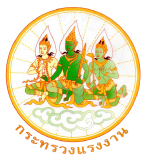The Labour Minister and committee visited Thai workers in Moshav and Kibbutz, in Northern Israel, and listened to updates on the situation in the area with preparations of a plan to help Thai workers.
On December 19, 2018, Labour Minister, H.E. Police General Adul Sangsingkeo; Permanent Secretary of Labour Mr. Jarin Chakkaphark; Director of the Department of Employment, Mrs. Petcharat Sinauy and committee travelled from Thailand to Queen Alia Airport in Jordan. The party was welcomed by Mr. Pornpong Kanitthanon, Thailand Ambassador to Amman before departure to Ben Gurian Airport in Israel. The visit to Israel aimed to listen to problems, monitor unrest and prepare a plan to protect Thai workers, and to meet with Thai workers at Mocha / Kibbutz, in Northern and Southern Israel.
The Labour Minister and committee explored Haifa Port’s evacuation route with Mr. Joseph Gillor, Honorary Consul-General from Haifa, and port authority officials, welcomed and led the survey of places with Thai workers, as part of a response to political unrest, war, and natural disaster in Israel. The Royal Thai Embassy in Tel Aviv and the Labour Division has prepared to accommodate the unrest in Israel and has listed names and telephone numbers of Thai workers. It has also established a coordination center to monitor any information on movements and has prepared vehicles and budgets for evacuation along designated routes. The level of operation is divided into 5 levels: level 1 is normal situation; level 2 is unusual situations and signs that may cause unrest; level 3 is unrest but not yet affecting the safety of the people; level 4 is unrest and impact on the safety of the people; and level 5 is unrest with continuing and spreading violence.
At current in Israel, the Israeli government has a policy of controlling and managing migrant workers in two ways. This is the consideration of the most demanded jobs in the market which are nursing or caregivers, equivalent to the need of 50,000 people, followed by jobs of expertise that require specialised knowledge and skills such chefs and artisans, equal to 5,400 people. Then there is the use of bilateral agreements on the import of foreign workers in scarce fields. Thai workers are very much in need by Israel, especially in agriculture. Israel allows only workers from Thailand to work in the agricultural sector for a period of 5 years and 3 months. The first visa agreement is for a period of 2 years, after which it will be renewed annually. The current minimum wage rate is 5,300 Shekels/month or about 46,900 Baht, or about 562,800 Baht per person, per year. At present there are 24,746 Thai workers in Israel; 23,256 workers are legally employed, including 22,871 agricultural workers under the TIC program, 300 welders/cooks, 45 curators and 40 in other professions, including 1,490 illegal workers.
——————————–
Spokesperson and Publication Sub-Division/
Division of Public Relations/
News by Chaninthorn Phettab/
Information & photos by Bureau of International Cooperation/
19 December 2018/




